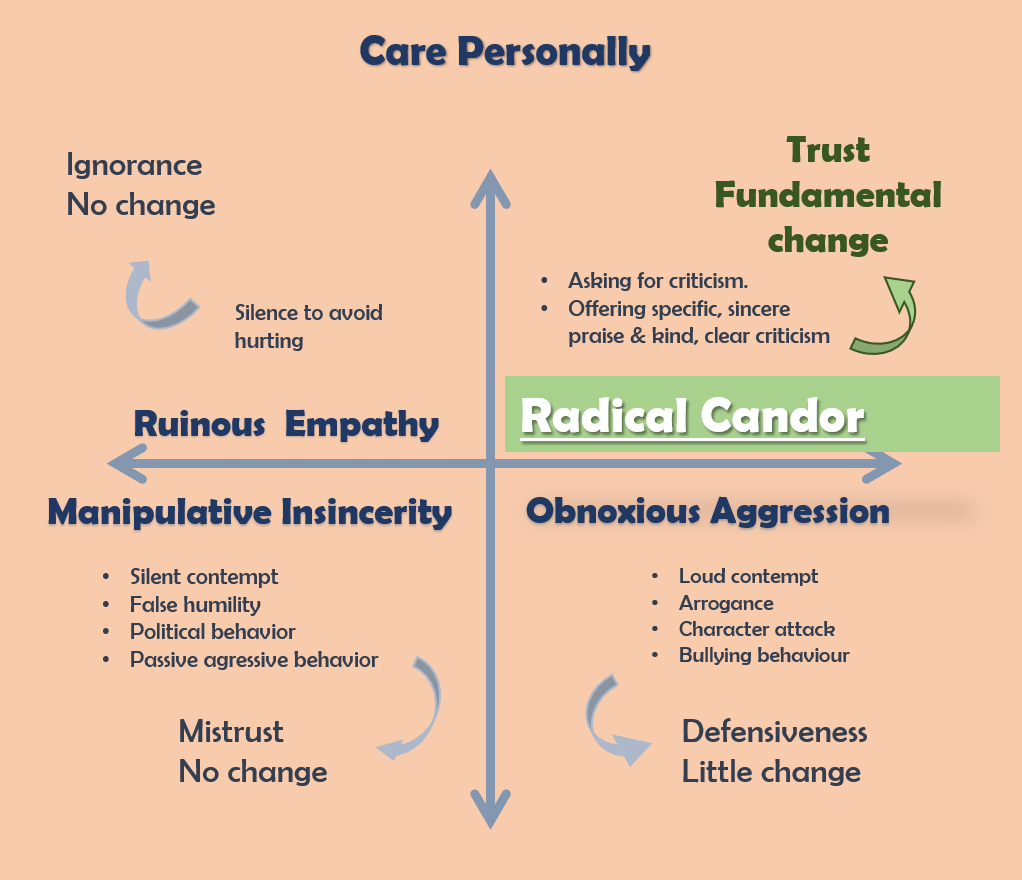
Radical Candor: The Leadership That Retains Talent
❓ Have you ever worked with managers who never gave you feedback until it was too late?
❓ Have you ever felt that your efforts go unrecognized, as if you were just another cog in the machine?
❓ Have you seen how poor leadership affects customers?
❓ How can we expect a CSM to motivate customers if no one motivates them?
❓ How can we expect transparency with customers if it’s not practiced internally?
❓ How can we strive for excellence if the team itself feels invisible?
In Customer Success, we are trained to measure, analyze, and optimize the customer experience, but what about the team’s experience?
If we want a high-performing team, it’s not enough to talk about KPIs, expansion revenue, or churn. We need to discuss something deeper: leadership, trust, and work culture. And this is where Radical Candor comes in.
💡 What is Radical Candor, and why is it key in Customer Success?
Kim Scott, a former executive at Google and Apple, developed the Radical Candor philosophy based on two fundamental pillars:
✅ Personally Caring: It’s not just about being a good boss; it’s about being a good human being. Knowing your team, understanding their aspirations and concerns, and showing that their well-being matters just as much as their performance.
✅ Directly Challenging: Saying what you think with honesty and clarity, without beating around the bush, but also without cruelty. Providing useful feedback that fosters growth without crushing motivation.
In Customer Success, where customer retention depends on relationship quality, applying these principles not only strengthens the team internally but also directly impacts the customer experience.
🧭 The Radical Candor Framework: A leadership compass

To understand how this concept applies to team management, Scott presents a framework that helps visualize the different leadership and communication styles within an organization.
The diagram highlights four key quadrants:
❌ Ruinous Empathy: When a leader prioritizes the team’s well-being but avoids giving honest feedback for fear of discomfort. Despite good intentions, this can hinder the team’s growth.
✅ Radical Candor (the goal): The sweet spot where personal care is combined with direct challenge. Here, feedback is given sincerely, without fear, but with the intent to help the other person grow.
❌ Obnoxious Aggression: Communication is direct and unfiltered but lacks concern for its impact on the team. This can create an environment of fear and insecurity.
❌ Manipulative Insincerity: The lack of candor combined with apparent empathy becomes a trap. Difficult conversations are avoided, leading to frustration and distrust.
📝 Leadership that retains talent: How to apply Radical Candor in Customer Success

🔹 A leader who supports, not supervises. A great CS manager is not there to micromanage tasks but to help their team overcome obstacles, manage priorities, and grow in their careers. It’s not just about efficiency—it’s about trust.
🔹 Consistent and real feedback. Unclear expectations and fear of difficult conversations leave many employees uncertain about their performance. Feedback should be immediate, honest, and balanced.
🔹 Professional development as a priority. Not everyone in CS wants to become a manager or climb the corporate ladder, but everyone wants to grow. A great leader helps each individual connect their current role with their future aspirations.
🔹 Transparency in workload: The power of Kanban. Kanban is a tool that makes real work visible, eliminates biases, and fosters collaboration.
🔍 Performance reviews through the lens of Radical Candor
One of the biggest challenges in team management is performance evaluation. Kim Scott argues that many traditional reviews create demotivation, bias, and lack of clarity.
📌 Key solutions from Radical Candor:
🔹 Continuous feedback instead of annual reviews.
🔹 Clear and relevant evaluation criteria.
🔹 Transparent, fair career paths based on impact, not comparison.
🔹 360° reviews instead of unilateral assessments.
📌 How to apply this in Customer Success?
🔹 Avoid frustration and fear: Regular feedback helps professionals improve without the anxiety of unexpected negative reviews.
🔹 Encourage collaboration and growth: Fair and transparent evaluations create a culture of mutual support instead of internal competition.
🔹 Improve the customer experience: When CS teams feel motivated and have clarity about their performance, it reflects in how they manage customer relationships.
🌐 Companies that have applied Radical Candor and their benefits

💼 Netflix: Known for its culture of radical and continuous feedback. Managers are required to demonstrate that they care about their team’s development and provide clear, honest feedback without waiting for annual reviews.
💼 Adobe: Replaced traditional performance reviews with continuous check-ins, allowing employees to receive real-time feedback, increasing retention and engagement.
💼 Google: Implemented promotion committees where managers from different areas review promotions from other teams, eliminating favoritism and ensuring merit-based advancements.
🌍 Does this only affect Customer Success?
Not at all. Radical Candor is a leadership model that benefits the entire organization.
🔹 Impact on Sales: A sales team with transparent, direct leaders communicates better, receives real-time feedback, and closes deals with greater confidence.
🔹 Impact on Product: How can CS and Product teams align if there isn’t honest communication about real customer needs? A Product team that receives radical feedback can improve strategy without relying on assumptions.
🔹 Impact on HR: When managers apply Radical Candor, employees feel more motivated, have clear career paths, and experience less frustration. This reduces turnover and strengthens company culture.
When an entire company embraces Radical Candor, the benefits include:
✅ Lower turnover and higher talent retention, where people want to stay and give their best.
✅ A culture of transparency and trust.
✅ Faster, data-driven decision-making, not based on assumptions.
🚀 Conclusion:
A team that trusts its leadership, receives honest feedback, and has a clear growth path not only stays in the company but also performs at its best.
📢 Performance reviews should not be a punishment or a formality, but a real opportunity for growth for everyone. 🚀
🔭 If you’re looking for effective, tailored tools to improve your reports or manage your team meetings, feel free to reach out! 📧